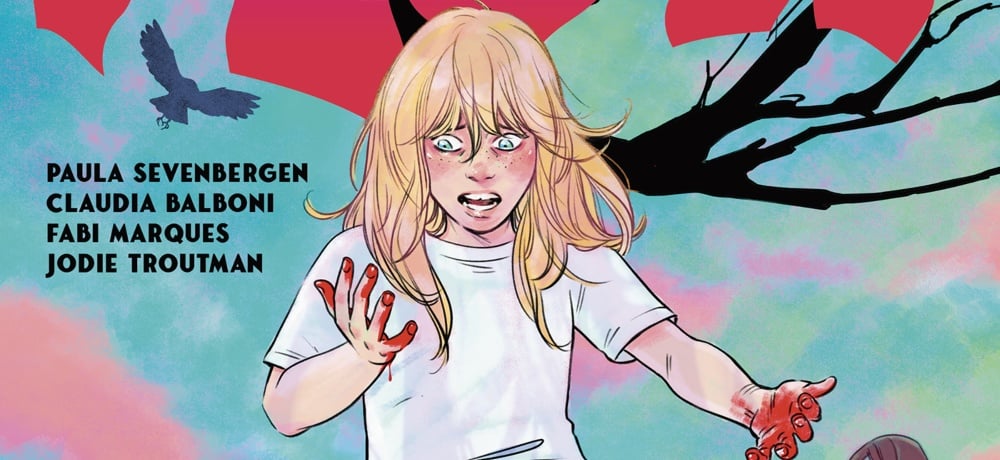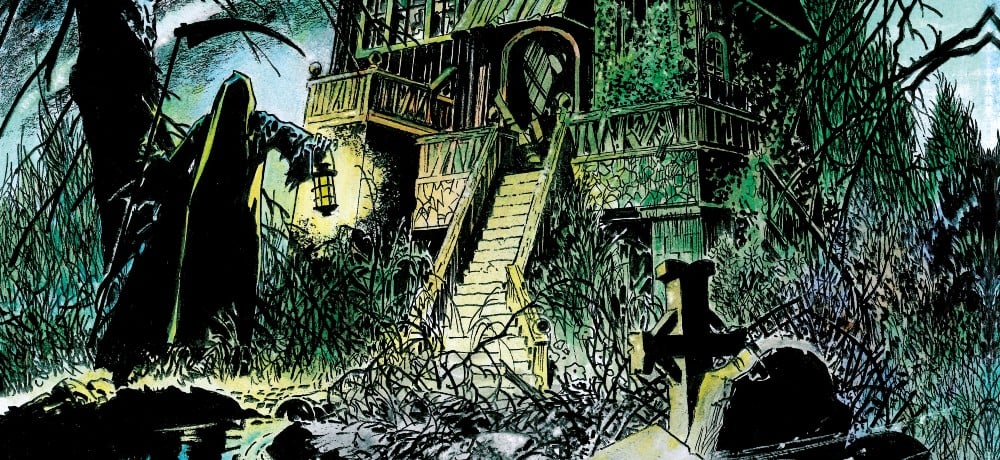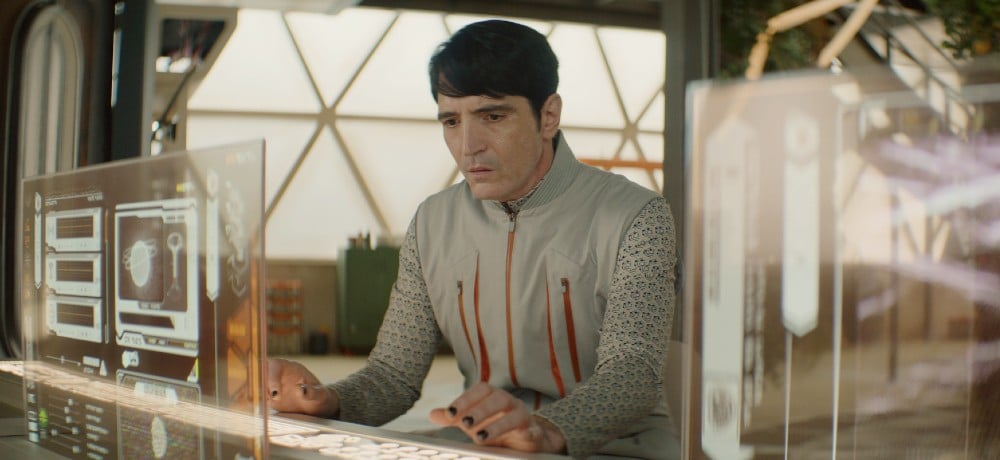






David Dastmalchian is a deeply human machine of creativity. In addition to acting, he screenwrites, dons the cape of Dr. Fearless, hosts Grave Conversations, runs his own horror-centric production company, and writes comics that Daily Dead founder and editor-in-chief Jonathan James praises. Given all this creative bandwidth, Dastmalchian’s latest role couldn’t make more sense.
In the bloody, funny, and offbeat Apple TV+ series Murderbot, he plays Gurathin — an augmented human with access to plenty of data. That access is part of why he distrusts the titular robo-protector (Alexander Skarsgård), whose job is to safeguard peace-loving hippie scientists on the job. The show is a heightened yet grounded adaptation of Martha Wells’ work, blending sci-fi action and tasty gore with human conflict and comically mundane squabbles.
Dastmalchian, also known for Late Night with the Devil, recently spoke with Daily Dead about the bloody fun show, his comics and horror hosting duties, and the kinds of stories he wants to continue telling. [Editor's Note: Minor spoilers follow for those that have not been keeping up with Murderbot]
In the early episodes, Gurathin is set up as an antagonist of sorts to Murderbot, but most of what he says is true.
David Dastmalchian: What Gurathin said is a thousand percent true. The SecUnit is totally weird. It’s malfunctioning. It’s not safe. Something is off. I don’t mean to correct the interviewer, but… here’s what’s so wonderful about the world Martha Wells created: more than one thing can be true at the same time. Surprise!
That’s what it’s like to be a human being. In reality, oftentimes stories are distilled down — and storytellers distill down ideas, concepts, and characters — into the simplicity of a binary: this is this, and this is that. That’s not the world Martha Wells was interested in creating. It’s not the world she created, and it’s not the world that [creators] Chris and Paul Weitz brought to life with Murderbot.
So is Gurathin right? Yes. Is Gurathin his own worst enemy because he has such a difficult time trusting and putting faith in others and allowing himself to be vulnerable to others? A thousand percent. The masterwork of the way that they put this show together was creating this ensemble, these incredible actors in those scenes where you might see me or my approach to the character as antagonistic, I’m just trying to get in there and understand.
Gurathin is a great reflection for me on my life. I often go through the world just on the aggressiveness of the attack, looking for what’s wrong with things. Sometimes, when you think about Dr. Mensah’s (Noma Dumezweni) approach, like, “Let’s sit back, let’s talk about this,” as they say. Gurathin’s like, “Fuck that. We don’t need to talk about shit.”
I just watched episode seven. Without spoiling it, we learn about Gurathin’s complicated past. How much did this reveal influence your choices in the first few episodes?
David Dastmalchian: I haven’t really gotten to talk about this in the press, but we’ve done a number of conversations now — you and I — and I can tell you, showing up to work that day, for that scene that I know you’re referring to, was one of the hardest things I’ve ever had to do as an actor. I was coming up on, at that point, my 22nd year in a journey of mental health and sobriety. I was going to be performing dialogue that was so incredibly written and that was so incredibly personal in a way nobody even realized how personal it was.
And yeah, I was able to look into the eyes of Tattiawna, Akshay, Sabrina, Tamara, and ultimately Noma, and what an incredible director, Roseanne [Liang], we had that day. She just gave us this space to feel safe and go there.
But it was intense and powerful, man. I watch the show with people I love every week. Tomorrow night we’re gathering with Bryan Fuller and my little group of friends to watch the show, but when that episode comes in particular, I don’t know if I want to show up that night. That’s going to be a hard one. But it’s beautiful. It’s not a bad thing. It’s a beautiful thing. I’m grateful that the universe provided such an experience for me and that Paul and Chris created that.
After that scene, did it feel cathartic? What went through your mind?
David Dastmalchian: I fell into my mind — I probably didn’t really do this, but in my mind — I collapsed in the arms of my castmates. They just lifted me up so much that day, as did the director, writer, and showrunner. Every day on that show, everyone was so there for you and made you feel safe and supported. But that was a big one.
I remember going home and sitting there and doing an online support group that I logged into that night, and I felt proud. I felt like, wow — I was able to be professional, show up, do the work that I was called upon to do while navigating stuff that felt personal and emotional. I like to think it didn’t detract in any way from the work, maybe even enhanced it. But whatever came of it, I do think there’s — even if it’s a micro drop of extra something in there — how could there not be, considering how personal that story was? Gurathin was speaking for David at that moment.
Something always apparent in speaking with you is you deeply feel what a character feels. Have you always had this level of sensitivity to the characters you play?
David Dastmalchian: It's really important for me to be aware of myself and aware of how much the work or the character is affecting me personally, and that can transcend just the themes or the emotionality of the character. Sometimes it's the long hours, sometimes it's the demands of repetitively getting to emotional states of being. I have an incredible network of support in friends, family, sobriety, and mental health that I lean on so that I don't have to — I’ve just gone on and told you how much I leaned on my cast, but in the way that I think is healthy, in the way that we can creatively be there together.
While at the same time, it's important for me to invest the time and energy into taking care of myself and being aware, going, “Oh my God, wow, this role is bringing stuff up for me.” There's stuff physically as you progress through this season —the threat of danger, real danger, and violence happens in really intense ways. So, there are things that my body and my voice and my person got the opportunity to experience. Even though I know it's all make-believe — you walk away at the end of the day — your body didn’t know that that didn't really happen. So, it’s just an evolving toolkit of ways of checking in with myself and staying healthy.
When you’re surrounded by this level of world-building, how does it inspire your own writing and comics?
David Dastmalchian: The ability to put layers of complexity and hold space for characters to be so much more multidimensional than sometimes my easier-path brain would like to go when I'm writing — and people might laugh reading this, but that's okay. I don't care. If I'm writing a comic book about a Gorgon who is going into battle with a bunch of mech robot animals — which is a plot I wrote this year in one of my favorite comics that I'm writing — I want that character to have space within themself for all of the conflict, all of the stuff that makes it so hard to be a person.
Speaking of, how is Count Crowley these days?
David Dastmalchian: I'm so proud of where we've gotten thus far with Jerri's journey. Obviously, she had stumbles in this last adventure, but she also learned a lot about the metaphysical and the supernatural. She's coming to realize that her lone source of mentorship, Vincent Frights, is a very fallible and declining person. She's now having to learn how to rely on herself as well as other people that life is bringing into her path.
I am, as we speak, dreaming up all of the stuff that's now been introduced, including the Frankenhooker-inspired characters, what's happening with werewolves, and of course, the big vampire assault. It's a slow and long process, but that's okay, because then when it finally gets to find its way to readers, they see how much work, thought, and love we've put into everything.
When in your career will you be hosting — whether it’s on a streaming service or wherever — a monster-of-the-week show?
David Dastmalchian: I think there’s a world where my schedule slows down at some point and I want to take things a little easier, where I just want to read during the day, think about the movies throughout the week, write some jokes, get in makeup on Friday night, and do a live broadcast. I mean, that’s absolutely going to happen in my lifetime.
I already have been building up Dr. Fearless — my horror host character who I’ve been developing for years. Thankfully, Dr. Fearless has gotten a lot of mentorship from people ranging from Svengoolie to Crematia Mortem to Joe Bob Briggs to Doctor Z, Dana Gould. There are currently regional horror hosts crushing the game.
From Dario Eville in New Orleans to Marlena Midnite in the Quad Cities, and now nationally, and The Mummy and Monkey. There's tons of horror hosts doing their thing, and I know there's a space for Dr. Fearless. I just have to find the right platform. I do work with the Boulet Brothers. I’m grateful we've just announced that we're doing a Holiday of Horrors special together. I am excited for you guys to see it.
You’re working on many projects at your production company, Good Fiend. Obviously, it’s a brutal time in the industry. How’s your experience been developing and seeking financing in horror?
David Dastmalchian: Historically, the entertainment industry is fraught with risk. And so, the way for me and my team here at Good Fiend Films that makes the most sense in attracting producing partners, financing partners, investment partners, is digging into the sandbox of the stuff we love, trying to tell the stories as authentically and as entertainingly as possible, and trusting that the right people at the right time will come.
It’s very hard to trust that when the economy, the industry, the platforms all feel like they’re constantly shifting, changing. It’s volatile. But in all honesty — and I don’t say this to dismiss the stresses and strains of being an entertainer or any person in 2025 — it’s probably always been really, really hard. There’s always been some challenge to be faced.
And so, I try to surround myself with people who wake up every day and look at challenges as opportunities and ways in which we can explore the means by which we can find audiences. And if that’s me doing a live theater performance of a spooky play that I want to do — great. If it’s publishing comic books, if it’s putting out a movie I love on VHS because suddenly people are wanting to see their films on VHS – great.
This isn’t a Good Fiend thing obviously, but I’m currently working on a show that’s on the platform that is basically just killing the game when it comes to scripted content. I am inspired. I have this little tiny company, but I’m working at Apple+ right now. I’m following a lineage of show after show that is so incredible. And so I go, “Something’s working out there.” Somebody took a Martha Wells book, which is complex and beautiful and challenges you and entertains you, and said, “We’re going to make this incredible show.” It’s got to give you faith in something out here.
[Editor's Note: This interview has been edited for length and clarity.]